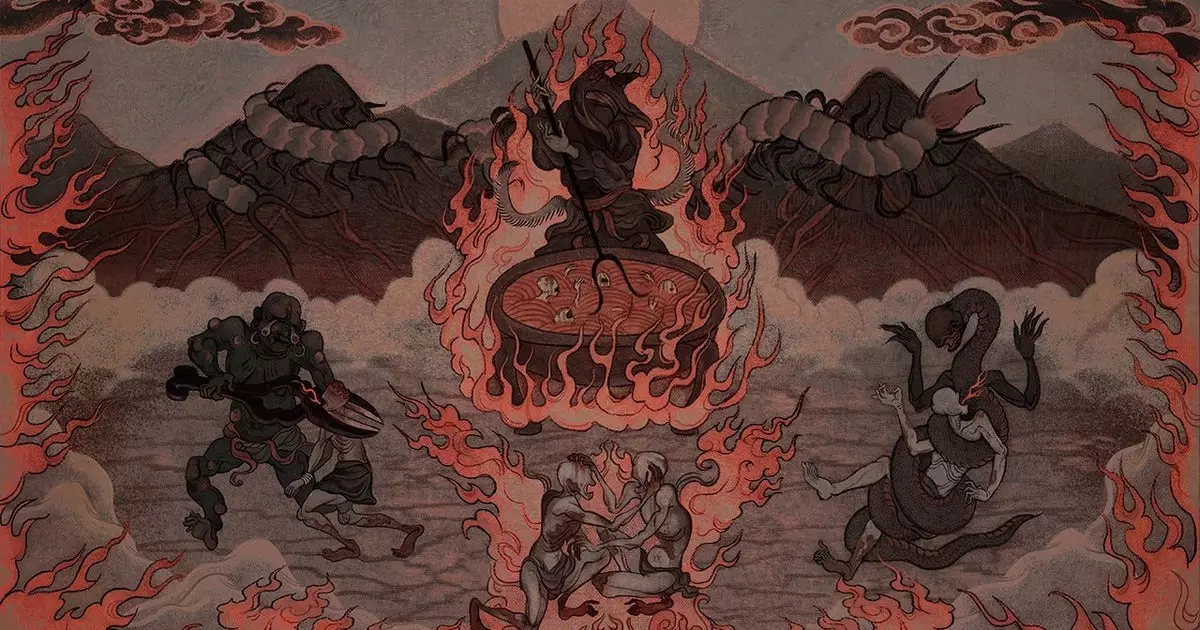In an era where horror has largely transitioned into slick and polished narratives, “Labyrinth of the Demon King” stirs the pot with its unapologetic embrace of the grotesque and the unsettling. It invokes influences from iconic classics like Silent Hill and Amnesia: The Dark Descent, but rather than merely replicating their essence, it distills their very spirit into an experience that feels hauntingly familiar yet refreshingly disorienting. This game does not just exist; it envelops the player into a visceral nightmare where dread lingers in every corner.
Set against the backdrop of a mythical feudal Japan, “Labyrinth of the Demon King” crafts a world where danger lies in the air, much like a thick fog. Each step into its shadowy corridors is a gamble with the twisted unknown, where manual save points remind players of their fragility. The haunting aim of the game is to locate and slay a malevolent yokai—a task that feels less about triumph and more about survival, underscoring the frailty of existence in its ghastly portrayal of life amidst despair.
An Enticingly Unpleasant Environment
As players traverse this repugnant landscape, they find themselves exploring dilapidated houses filled with grotesque entities that feel like manifestations of one’s worst fears. With limbs reminiscent of horrors best left unimagined, these foes seem oblivious to the player’s narrative, treating them as just another target in a chaotic world. Battling these “filthbastards,” as they are poetically dubbed, reveals a combat system that feels archaic yet intriguingly combative, reminiscent of the stamina-based approaches seen in earlier From Software titles. It evokes a sense of nostalgia while simultaneously testing one’s strategy and skill.
In the game, players are armed with an arsenal that feels deliberately underwhelming: a dilapidated katana, tainted bandages, and a bottle of sake. The equipment underscores the struggle for survival in a world that is anything but accommodating. The disillusionment of reliance on such meager tools only reinforces the game’s intentional descent into madness. As one hunts for a missing key—or as the narrative suggests, a “cat” lurking on the second floor—the journey turns into a series of desperate attempts to escape the entwined claws of chaos.
Gameplay That Defies Convention
The design of “Labyrinth of the Demon King” is refreshingly icky, with each mechanic woven into the fabric of unease. The act of smashing crates to uncover both treasures and cockroaches evokes a certain kind of grim satisfaction, turning mundane activities into necessary evils. The gameplay, while seemingly primitive, complements the gaming experience by emphasizing struggle and endurance. Kicking enemies to disrupt their attacks can be a particularly satisfying move, albeit one that can inadvertently send them into a safe zone, offering no reprieve from the looming threat.
Moreover, the claustrophobic feel of the game is compounded by its oppressive sound design and dynamic camera angles that draw the player deeper into the narrative. It captures the essence of PS1-era horror, invoking not just nostalgia but a visceral reaction to the foreboding atmosphere. Each creak of the floorboards adds to the incessant tension, and the daunting labyrinthine corridors echo with a cacophony of dread that lingers long after gameplay ceases.
The Heart of the Horror Experience
In this labyrinthine horror, players also encounter the promise of uncovering secrets and confronting generational trauma through its haunting imagery and narrative subtext. The landscape is littered with thematic elements that resonate beyond mere scares, blurring the lines between the monstrous and the mundane, the dream and the nightmare. By weaving these themes into a tapestry of terror, the game elevates itself beyond just a horror title—it becomes a reflection of the human condition, marked by struggle, isolation, and raw vulnerability.
“Labyrinth of the Demon King” transcends traditional gaming experiences by crafting an atmosphere that is not only terrifying but also intellectually engaging. It’s a distinctive meditation on fear, drawing players into a carefully curated space where dread is not simply an enemy, but an integral character in the unfolding nightmare. As players delve deeper, they are bound to question not only the world around them but their own place within it, creating an immersive experience that is as haunting as it is captivating.

